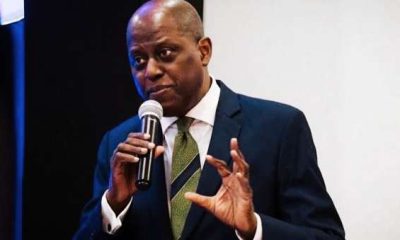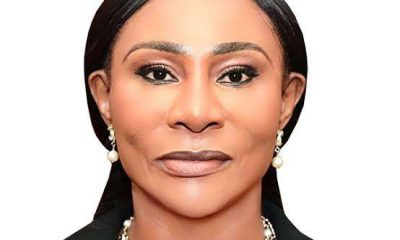Business
Amid lingering headwinds, CBN plots new path to stability

BY EMEKA EJERE
Recent pronouncements by the governor of Central Bank of Nigeria (CBN), Olayemi Cardoso, may have provided some clue on the direction the apex bank is going in the pursuit of its core mandate of achieving price stability.
Investors, potential investors and the entire business community were left guessing after the postponement of the meeting of the Monetary Policy Committee (MPC) for a second time since Cardoso was nominated to the post of CBN governor in September, 2023.
The MPC, which was expected to hold its last meeting for the year last week (Monday and Tuesday), usually meets bimonthly, but has not met since July, when it raised the monetary policy rate (MPR), also known as the main interest rate, by 25 basis points to 18.75 percent.
On September 26, Cardoso announced plans to clear about $7 billion in FX backlog, with Wale Edun, Minister of Finance and Coordinating Minister of the Economy, saying the government was expecting $10 billion to ease dollar liquidity in the FX market.
Also, investors have been looking to the MPC meeting for signals on how the central bank will rein in inflation that is accelerating at the fastest pace in almost two decades. They are also anticipating an update on the overhaul of the nation’s foreign-exchange controls initiated by President Bola Tinubu in June.
New FX laws, guidelines
Mindful of the situation, Cardoso, while delivering a keynote speech at the 2023 Annual Bankers Dinner of the Chartered Institute of Bankers of Nigeria (CIBN), in Lagos on Friday, disclosed that the apex bank will soon introduce a new set of foreign exchange laws and guidelines to address naira depreciation and achieve exchange rate stability.
The instability of the naira has persisted despite recent moves by the central bank to clear the backlog of foreign exchange forward contracts. The naira is one of the worst-performing currencies in the world, losing about 40 percent of its value since June, the World Bank recently disclosed.
Recently, the Economic Intelligence Unit, the research and analysis division of the Economist Group, disclosed that the CBN does not have the required firepower to clear the backlog of foreign exchange orders. This is expected to continue to put pressure on the naira.
It stated, “In Nigeria, an unsupportive monetary policy implies that the naira will remain under pressure, while the central bank lacks the firepower to adequately supply the market or clear a backlog of foreign exchange orders, which will keep foreign investors unnerved. High inflation and a continued spread with the parallel market will leave the exchange rate regime unstable and result in periodic devaluation.”
The CBN, according to Cardoso, would also conduct a new recapitalisation exercise for the banking industry, by directing banks to increase their minimum capital base to a level sufficient to support the vision of a $1trillion economy.
Nigeria’s new government, as outlined in the widely circulated Policy Advisory Council report on the national economy earlier this year, has set an ambitious goal of achieving a Gross Domestic Product (GDP) of $1.0 trillion over the next seven years, with clearly defined priority areas and strategies.
Cardoso also disclosed that the CBN would introduce a new licensing framework for fintechs and payment banks, warning that operators found engaging in activities outside their licenses will be sanctioned.
Citing the need to curtail the challenge of rising inflation, Cardoso said the apex bank will further tighten money supply for the next two quarters. He added that to further reduce excess cash in the banking system the management of the CBN had approved and would soon conduct another round of liquidity mop up via issuance of Open Market Operations (OMO), treasury bills.
“Our monetary policies will aim to achieve price stability, foster sustainable economic growth, stabilize the exchange rate of the naira, and reduce interest rates to facilitate borrowing and investments in the real sector. In order to ensure the proper functioning of domestic and foreign currency markets, clear, transparent, and harmonized rules governing market operations are essential.
“New foreign exchange guidelines and legislation will be developed, and extensive consultations will be conducted with banks and FX market operators before implementing any new requirements.
“Considering the policy imperatives and the projected economic growth, it is crucial for us to evaluate the adequacy of our banking industry to serve the envisioned larger economy. It is not just about the stability of the financial system in the present moment, as we have already established that the current assessment shows stability.
“However, we need to ask ourselves: Will Nigerian banks have sufficient capital relative to the financial system’s needs in servicing a $1.0 trillion economy in the near future? In my opinion, the answer is “No!” unless we take action.
“Therefore, we must make difficult decisions regarding capital adequacy. As a first step, we will be directing banks to increase their capital.”
Step in right direction
Analysts have commended the apex bank’s decision to direct banks to increase their capital in preparation to serve an envisioned $1 trillion economy.
A Relationship Manager, Corporate Banking at FSDH Merchant Bank Limited, Ayodele Akinwunmi, said the recapitalization will allow the banks to be well capitalised to continue to support the economy given the recent changes in the economy.
According to him, it will also position the industry well to take advantage of the expected growth in the economy. In addition, the recapitalisation process will attract foreign investors into the banking industry through Foreign Direct Investments (FDIs), thereby helping the country to drive part of the much needed long term foreign currency investment into this important and attractive sector to stabilise the value of the naira.
“The banking industry will also use the opportunity to pitch to select foreign investors to drive the investments,” he said.
In his reaction, the Chief Executive Officer, Centre for the Promotion of Private Enterprise (CPPE), Dr. Muda Yusuf, described the move as a welcome development because banks’ capital has been eroded.
He said minimum capital requirements of the banking industry need to be reviewed in the light of the considerable loss of value amid depreciating domestic currency.
Yusuf recalled that during the banking consolidation exercise of 2004, the minimum capital requirements for banks was raised from N2 billion to N25 billion, noting that the revised capital requirement was an equivalent of $187 million.
“Today the same N25 billion is an equivalent of just $32.5 million. This is a clear indication of the phenomenal erosion of the capital base of the banks. Recapitalization of the banks has, therefore, become imperative. It is important to ensure that the capital base of banks can support their current exposures in the interest of the stability of the financial system,” Yusuf said.
Too early to rejoice
However, other analysts expressed reservations, saying until the policy steps begin to yield the desired result, anyone,s who is already giving kudos to Cardoso may be doing so too early.
A Chartered Accountant, Dr. Agu Onwuzuruoha, in a chat with our correspondent said: “We should not be pretending that Tinubu and his team just dropped from outer space. We should take a holistic view of things. Gloating over Cardoso’s speech would serve no useful purpose. We should wait for the policy statements to yield desired results before rolling out the drums.
“Intellectuals MUST maintain a clinical detachment from politicians for their analysis to have traction. We are not an extension of the Federal Ministry of Information, just a gentle reminder.”
Also in a chat with our correspondent, Chief Okwudili Ijezie, lead partner at Okwudili Ijezie & Co, Chartered Accountants, regretted that the CBN has lost its independence, insisting that Cardoso simply said what the President wanted him to say.
“The way President Bola Tinubu grappled the Central Bank of Nigeria, an independent institution, and put his loyal godson, Cardoso, to be in charge of it, is most unfortunate. To me, the institution has lost its independence. And it’s now an appendage of the Executive. So, reading Cardoso’s Speech is like reading President Bola Tinubu’s speech on CBN,
“Go to United States and let me know whether the CEOs of the Federal Reserve Bank (equivalent of our CBN) are godsons of the Presidents of the United States.
“CBN has lost its independence. Emir Sanusi wasn’t an appendage of the Executive when he was the Governor of the Central Bank of Nigeria, just like Prof. Charles Soludo”.






